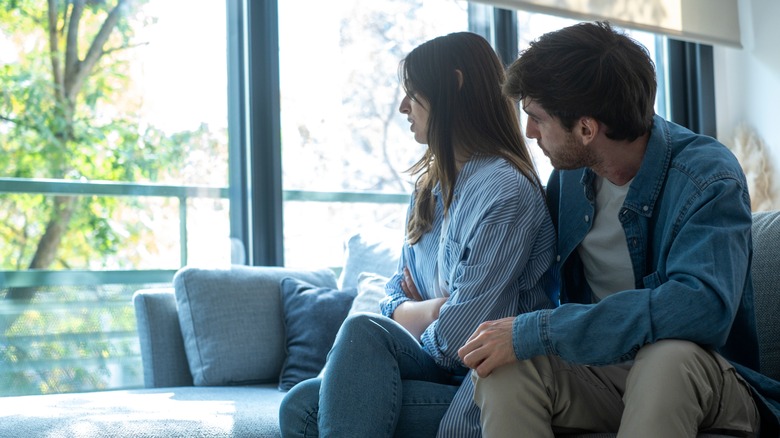Divorce Houses: Our Expert's Advice For Dealing With Your Home After A Split
Divorce can be a really difficult time in life, made even harder when home ownership is involved. When navigating the paths forward, you may wonder what there is to do about the shared property. Knowing it's a tough road, we reached out to two experts for their thoughts: criminal lawyer and defense attorney Benson Varghese, the founder and managing partner at the law firm Versus Texas, and Ramzy Ladah, trial attorney and personal injury lawyer at Ladah Law.
In an exclusive interview with House Digest, the two lawyers laid out the framework for dealing with a house. "In a divorce, the shared home is often one of the most significant assets to be divided," Varghese explained. "The fate of the divorce house is determined by several factors, such as state laws, the unique circumstances of the marriage, and any agreements reached between the spouses." Ladah similarly said that the conversation around the home is significant largely because of its emotional significance to the family. "It's not just a building; it's where memories were made, and figuring out what to do with it can be very emotional," he said.
Ladah said that sometimes the house situation is easy because the couple figures it out without the court's intervention. However, that isn't often the case, so the pair needs to figure out a way to negotiate the division of the home and other assets "Usually, the house and other assets are divided in a way that's fair but not always exactly equal," Ladah explained.
How to split the house
This isn't about divvying up stuff or negotiating who resides in the east wing — it's about determining how much of the home each of the divorcing parties owns (a good reason to fully understand home equity before diving in). "When a house is 'split' in a divorce, it means the equity is divided between the spouses," Benson Varghese told House Digest in an exclusive interview. "This can be an equal or unequal split based on factors like marriage length, contributions to the property, and individual finances. Courts try to distribute assets fairly, considering the needs of any kids and both spouses."
After determining the equitable shares, the divorcing parties have the option of one partner buying out the other's share of the property. Varghese explained that this way, one spouse can stay in the home. It's a good option when there are children involved as it can provide them stability, he added.
If a buyout occurs, it is vital for the divorcing couple to know the tax ramifications of the choice. Varghese said a buyout can create a capital gains tax situation for the seller, which happens when the property is sold for more than was spent to purchase it. "Emotional ties can make these choices difficult, so seeking mediation or legal advice is wise," he added. "State laws on property division also vary, so consult with a local legal expert for the best guidance."
You may want to sell the house
Ultimately, a divorce can signal that it's time to sell your house. Sometimes, it is the best choice for both parties. In an exclusive interview with House Digest, Ramzy Ladah said this decision has helped couples in the past. "If someone wants a fresh start after a divorce, selling the house is often the best choice," he explained. "It allows both people to move on, both financially and emotionally, and gives them money to find new places to live and start new lives. From what I've seen, clients who sell their houses often feel relieved and ready to move forward."
Ladah recalled a time with previous clients who both had significant emotional bonds with their house and chose to sell. He said they were able to work together to create equitable solutions for both of them. If you're ready for that step, there are a few things you can do to make your house more desirable and help it sell faster.
Even with selling on the table, it is possible that the process will be delayed until other elements of the couple's life are sorted, Ladah warned. "Sometimes, the sale of the house is put off until certain conditions are met, like when the kids are grown up," he said as an example. He also said there are cases where one spouse remains in the home and the other receives assets in exchange like the funds from a savings account.


